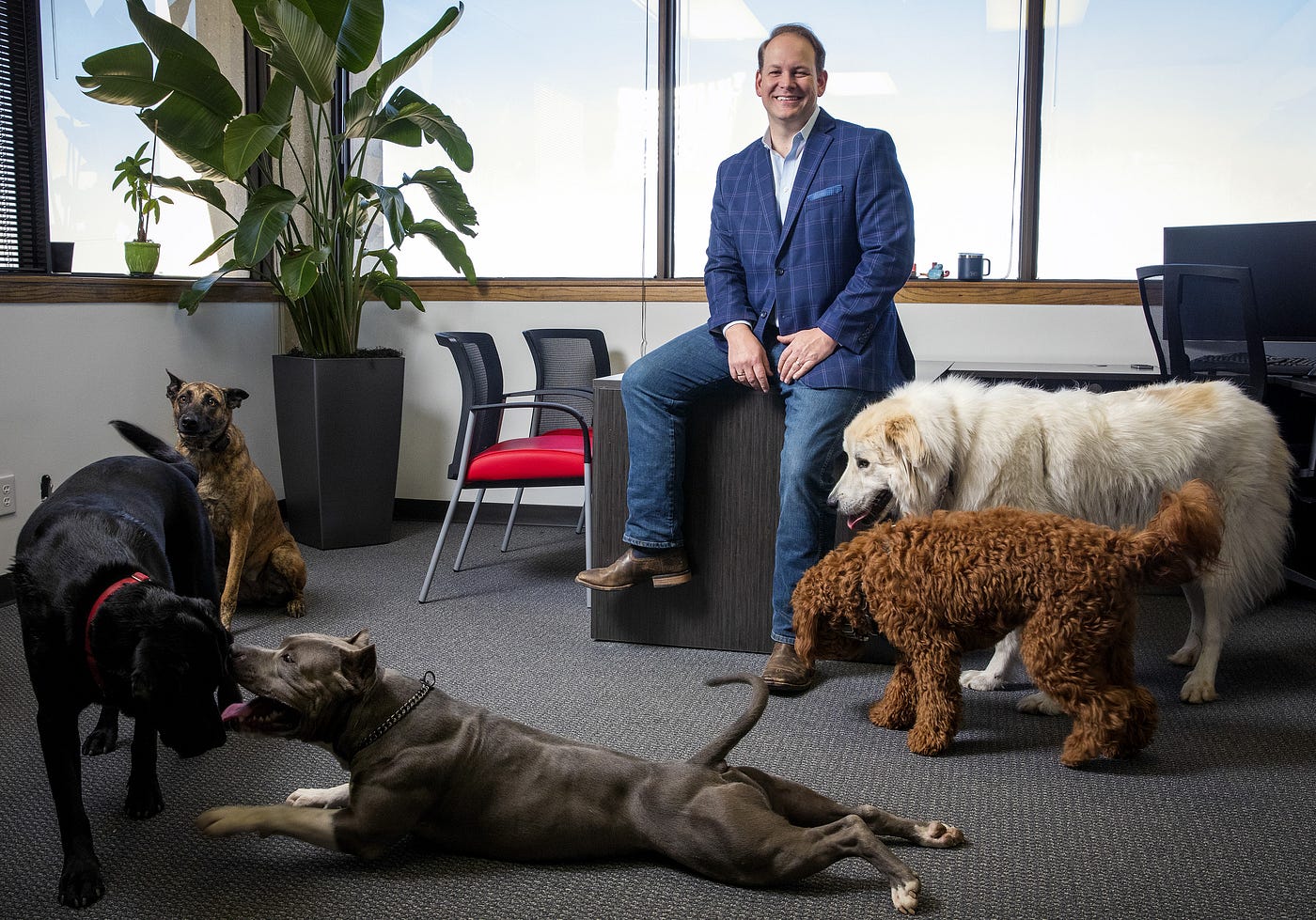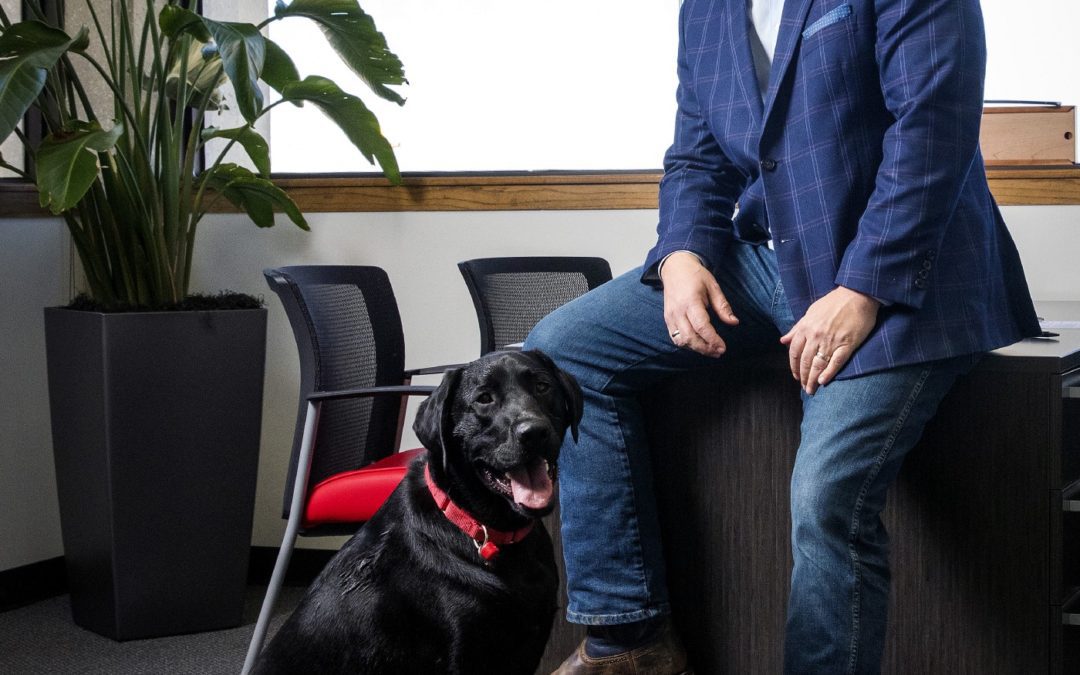You don’t have to know everything — Before I began my career, I assumed the CEO knew everything, and they were better at every functional area than the functional leaders themselves. I quickly learned that is not true, and a specific skill set makes a CEO good at what a CEO needs to do, but they don’t need to be an expert at everything. You don’t have to know everything to be a successful CEO.
An Interview With Ben Ari
As a part of our series called ‘Five Things I Wish Someone Told Me Before I Became A CEO’ we had the pleasure of interviewing Thomas Thill.
Thomas Thill, CEO of AmeriVet, Thomas Thill, spearheads the continued growth of the company, with now 147 veterinary partners and over 2,500 employees across the country. Thill has helped AmeriVet grow its operations and staff team exponentially, projecting that the company will grow to a total of 200 partners in 2022 and the company is currently on track to reach that goal.
A constant learner, Thill enjoys challenging himself and is driven by the sense of accomplishment he feels when he can help a start-up company with an important mission succeed. He believed that AmeriVet’s goal of “Better Business. Happier Vets. Healthier Pets.” would make an everlasting impact in the industry. So despite being in a high-paying and stable position, he took a risk on a new company with an untested model and was eager to be a part of an organization that would allow vets to better serve pets and pet parents by lifting the burden of time-consuming administrative tasks.
Thank you so much for joining us in this interview series! Before we dig in, our readers would like to get to know you a bit more. Can you tell us a bit about your “backstory”? What led you to this particular career path?
Heading into college, I thought I wanted to be a doctor. I excelled in math and science, so I assumed it would be a fitting career choice. However, once I got more ingrained with the course material of becoming a doctor, I realized I didn’t necessarily want that to be my career path, so I ended up graduating from college as a chemist.
I had a short-lived career as a chemist, and I only spent two weeks working as one when I realized I had made a massive mistake. I would sit at a desk all day, not speaking to anybody, turning dials on a machine, and I thought I had just wasted four years of college getting a degree in an industry that did not fit my personality.
I pivoted and went back to school, this time for business. I learned that I enjoyed the business side of things, specifically healthcare, where I have now spent most of my career. I started my career in business in healthcare working in pharma, medical devices, and, ultimately, services. Through my work, I found I had a passion for the people side of healthcare, specifically how healthcare was delivered.
My experience and work have brought me to where I am today, CEO of AmeriVet Veterinary Partners. AmeriVet was my first transition into non-human medicine, which I have really enjoyed as in the vet industry you have these changing demographics in how people treat their pets and having experience with human healthcare, I think there is a lot that could be applied to the vet space.
Can you share the most exciting story that happened to you since you began leading your company?
One of the most exciting things that has happened to me and a lesson I took away from it since I began leading the company, is you don’t know what you can get unless you ask.
I was looking for office space when AmeriVet was first getting started. In the generic startup mode and the early days of the business, I ran into someone at this organization called the San Antonio Economic Development Foundations. We were having a light conversation and diving into our businesses when I told him I was looking for office space and asked if he knew anybody who would be able to help me find what I was looking for, and sure enough, there was this whole program, that I didn’t even know about, that helps startup companies find office space in San Antonio for super discounted rent.
Because of this program, AmeriVet found excellent office space on the Riverwalk of San Antonio, which helped launch the company and made our company look more substantial and official than we were at the time.
I think it shows that you don’t know what you can get unless you ask, and in the business world, it is always important to make connections because you don’t know what is out there and who might be willing to help.
Can you share a story about the funniest mistake you made when you were first starting? Can you tell us what lesson you learned from that?
It is important to note that when it comes to working, sometimes you have to slow down to speed up, take the extra time to double-check things, and ensure you aren’t moving so fast so you can avoid silly mistakes.
In a startup world, you are moving fast and have 110 things to do daily. So early on, the toilet broke in the bathroom at our office, and I was drafting an email to let the office employees know that toilet was broken; instead of sending it to the office employees, I sent the email out to everyone at the company so the email went to all our vets and board of directors, people who didn’t need to be bothered by a broken toilet. In return, I got all these funny emails from our vets and board members making jokes and expressing concerns about our broken toilet. Further proving that sometimes you must slow down and be deliberate in your actions.
Is there a particular person who you are grateful towards who helped get you to where you are? Can you share a story about that?
I am incredibly grateful to my mom and believe she played a huge role in where I got today in my career. Growing up, I had a working mom with a fantastic work ethic that I believe she instilled in me.
My mom was in real estate and went against the grain. Instead of selling the cream of the crop houses that were expensive and fancy, she pursued what you would call mid and lower-housing real estate deals, and she pursued a lot of them. Due to her high sales volume, she was always at the top of her company. Her successful career in real estate had nothing to do with selling the most expensive houses in the area; it had to do with the volume and sales she acquired, which meant she was working harder than everybody else.
So as a kid, she instilled a go-getter work ethic mentality in me, which led me to start my first business at the age of 14. I continued to grow my business throughout high school, and it gave me the opportunity to buy my first car and all sorts of things. So, I assumed that her driven work ethic was the “norm.” It was how things got done. I have had that mentality throughout my whole career.
Most of our readers — in fact, most people — think they have a pretty good idea of what a CEO or executive does. But in just a few words, can you explain what an executive does that is different from the responsibilities of the other leaders?
As a CEO, I would say we are generally future-oriented. I think we spend more time thinking about how the company will win and gain success in the future, as opposed to executing daily tasks.
When you start to think about how a CEO vs. an executive spends their time, CEOs are trying to look around corners for the company, position it today, and take advantage of where it might be in five years.
What are the “myths” that you would like to dispel about being a CEO or executive. Can you explain what you mean?
One common misconception about being a CEO is once you make it to that level, the job will get more manageable, and the work will begin to slow down because you are at the top and have a good team reporting to you. However, once you achieve that title, you are responsible for the whole company, which is a more significant task and, at times, an immense burden.
You will have to begin thinking about all areas of the company with the same intensity as your functional area leaders. But, again, people believe that once you get to the top, everybody works for you, and you are just the CEO, almost like you are a figurehead. But it is incredible to see how hard the job is, how many hours go into it and how hard you work as a CEO.
In reality, being the CEO can be difficult because many people count on you to make the company succeed.
What is the most striking difference between your actual job and how you thought the job would be?
The significant difference between what I thought being a CEO entailed and what being a CEO is, returning to my point of being future-oriented. I initially thought I would spend most of my time thinking about the day-to-day business. Still, when I became the CEO, I spent a lot more time thinking about where I wanted the business to go and how I would get it there.
When you are asked as a kid, what you want to be when you grow up, you have to have that same mindset for your company.
AmeriVet, is growing so fast and doubling almost every year, and with that significant amount of growth year after year, you begin to have a better vision of what you want the company to look like five years from now. So, you have to look at your company’s long-term goals and start putting systems, processes, and people in place to reach them.
Do you think everyone is cut out to be an executive? In your opinion, which specific traits increase the likelihood that a person will be a successful executive, and what type of person should avoid aspiring to be an executive? Can you explain what you mean?
I think everyone has the opportunity to become an executive or CEO, but not everyone will be as successful as others. There are so many different types of leaders in different industries and businesses who have all found success in being a CEO, so the qualities that make a good CEO in one industry might not be a fit for another. However, I believe it truly comes down to grit and hard work.
For me, as a CEO, something that has helped me a lot in my career is having a strategic outlook and being a positive person. So, I am very focused on seeing the good things in people and situations.
But, as a CEO, you carry the burden of every person and employee that works for you. This can either crumble you or inspire you. It has ignited a fire in me to work harder than ever because many people look to you for direction. You want to give your employees a great career, a great place to work, a viable career path to promotions.
What advice would you give to other business leaders to help create a fantastic work culture? Can you share a story or an example?
When it comes to starting a company, many companies sit down and create of list of values, to help the team make decisions and help guide their employees. However, through my career and working at different companies, I have found that the values a company sets can be interpreted in many different ways. For example, if integrity is a value for a company, one could think it is the quality of honesty and strong morals. But, at the same time, another might interpret integrity as acting in honor and being responsible.
With AmeriVet, I built out behaviors instead of building out values because behaviors are values in action. The benefit of behaviors is that they are easier to understand, and everybody can see them similarly. For example, one of AmeriVet’s behaviors, which is funny but stands true, is, “Don’t be a jerk.” That’s it. Everybody understands what that means, and there is no confusion. It inspires my employees to be somebody that they want to work with. So, I drafted out our companies’ behaviors like that so people get what it means to work for AmeriVet specifically.
I think setting behaviors influences the company’s culture because everybody understands them and is on the same page. Still, we give out awards for the behaviors and talk about them all the time. I am constantly citing examples of employees demonstrating our work behaviors.
It also helps provide a framework for employees to have good interactions at work, and it has led AmeriVet to win multiple awards, such as Best Places to Work. However, it is essential to note it is not just about posting the behaviors on a wall and expecting everyone to live by them. You have to write them and talk about them with your employees so everyone understands what they mean.
How have you used your success to make the world a better place?
I donate to many charities throughout the year, but I believe giving back your time is more important than giving your money. Yes, giving money is excellent and can help support a cause and help the charity reach its goals, but giving your time and being hands-on allows you to see that your work is genuinely making a difference.
I did over 200 hours of community service last year, working at various kinds of food banks during COVID. When COVID hit, many people started to focus on their health and safety and forgot there were people without homes and hot meals. So many incredible food banks work tirelessly to assist those in need, and they can’t do it alone without the assistance of volunteers. That’s why I am so passionate about donating my time. After each shift of volunteering at the food bank, I left knowing that I have helped provide food for those in need and made a difference in the community by helping to collect, sort, pack, and distribute food.
Apart from volunteering my time at our local food banks, as a business, we support a lot of local shelters, and I take the time to foster dogs myself. Again, it’s one thing to give money to help the pets, but it is another thing to open up your home and give an animal a safe environment. You are taking care of the pets, taking them out in the middle of the night, feeding them, playing with them, and giving them the best life, they deserve for a short period until their adoption.
Additionally, AmeriVet partnered with Not One More Vet (NOMV), a nonprofit 501(c)3 organization, to participate in their Race Around the World event from September 1 — September 30, 2022, in an effort to raise funds to support veterinarians struggling with mental health issues. The donations raised through The Race Around the World event contribute to several of NOMV’s programs including: support grants to individuals in crisis, educational programming, peer support programs, and additional special initiatives. At the close of the race, the “AmeriVet Cares” race team logged a total of 2,203.33 miles. To support their efforts, AmeriVet Veterinary Partners contributed an additional five dollars per mile logged by their race team members, bringing the “AmeriVet Cares” race team to a total of $11,856.65 raised for Not One More Vet’s mission. AmeriVet also gifted the top four participants with new running/walking shoes for their contributions to the cause.

What are your “5 Things I Wish Someone Told Me Before I Started” and why?
The five things I wish someone had told me before I became a CEO are:
You don’t have to know everything — Before I began my career, I assumed the CEO knew everything, and they were better at every functional area than the functional leaders themselves. I quickly learned that is not true, and a specific skill set makes a CEO good at what a CEO needs to do, but they don’t need to be an expert at everything. You don’t have to know everything to be a successful CEO.
The importance of a cohesive team — When it comes to the work environment, the team is everything. Having a cohesive team, having a team that doesn’t create silos, and having a team that’s good at their functional areas are super important. Again, it’s not all about you being significant as the CEO and the most intelligent guy in the room, it’s about building a great team. I wish someone had told me; you need to build a great team to have a great outcome.
Your vision is more important than you think — Setting the vision for the company and reinforcing it, and helping people get behind what the vision is and how you’re going to achieve it is way more important than I thought. In the beginning, I thought it was one of those “Check the box things” that when you get to be a CEO, you got to have a mission, vision, and values, right? But I didn’t realize how important having a clear, distinct vision for a company that can be communicated at all levels is to the importance of driving success.
The importance of listening — You would think the CEO would be the one to constantly be telling people what to do and telling their employees how to get things done. But, in reality, one of the most important things you can do as a CEO listens and hear what is going on with the company, both listening to your employees and customer feedback.
It doesn’t have to be lonely at the top — CEO have coaches too. As a CEO, you are constantly trying to be better for your employees and company, so there are coaches and mentors out there that can help you navigate those waters and be the best CEO for your company. So, it doesn’t have to be lonely at the top, and resources are available to get better at what you do because, as a CEO, you are never done learning and never done at getting better.
If you could inspire a movement that would bring the most amount of good for the greatest number of people, what would that be?
If I could inspire a movement that would bring the most amount of good for the most significant number of people, it would be as simple as spreading positivity and kindness. As previously mentioned, I am a very positive person. That has contributed to my success as a CEO, but I believe positivity and kindness can spread so much more than just the four corners of an office building.
If we treat others in our communities with kindness, it can cause a ripple effect of good fortune for many people. Spreading kindness starts with positive actions; these small gestures develop empathy and unite people.
Can you please give us your favorite “Life Lesson Quote”? Can you share how that was relevant to you in your life?
“Don’t let perfection get in the way of good”
This quote is said in a few different ways, but it holds the idea that perfection is the enemy of good. Therefore, I believe this quote follows Pareto’s 80/20 rule. If you are focused on perfection and ensuring everything is done perfectly, you won’t be able to get the amount of work you need.
Perfection is a pretty high bar, so you need to ask yourself if you will ever get there. It is important to complete a few tasks and complete them nicely to help establish the company instead of taking forever to complete a task to perfection.
This quote drove me early on when starting AmeriVet to help me move at a pace and build a company within five years.
Is there a person in the world, or in the US with whom you would love to have a private breakfast or lunch with, and why?
If I had the opportunity, I would enjoy having lunch with Richard Branson. But I would want to have lunch with someone who became a billionaire because they just did business better, not somebody who became a billionaire because they invented something.
I am not out there trying to revolutionize something; I am trying to build something. Richard Branson is an entrepreneur and business magnate and has built a company that controls over 400 companies in various fields. However, he is also a businessman who is not afraid to fail and has remained optimistic throughout his career. Branson once said, “I suppose the secret to bouncing back is not only to be unafraid of failures but to use them as motivational and learning tools… There’s nothing wrong with making mistakes as long as you don’t make the same ones repeatedly.” As a CEO, this quote has stuck with me because you will never be successful 100% of the time, but you must keep trying. I think that marks the difference between a good leader and a great leader.
Thank you for these fantastic insights. We greatly appreciate the time you spent on this.





